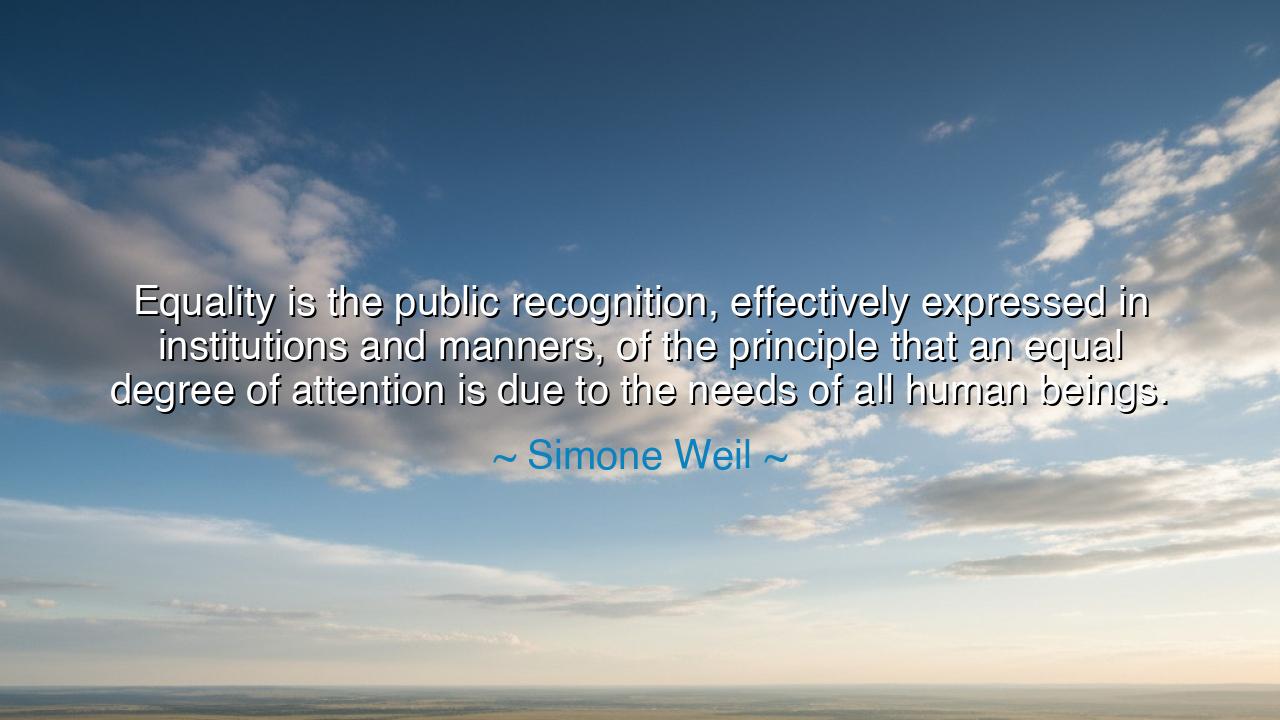
Equality is the public recognition, effectively expressed in
Equality is the public recognition, effectively expressed in institutions and manners, of the principle that an equal degree of attention is due to the needs of all human beings.






The words of Simone Weil rise like a solemn hymn from the depths of conscience: “Equality is the public recognition, effectively expressed in institutions and manners, of the principle that an equal degree of attention is due to the needs of all human beings.”
These are not the empty echoes of politics, nor the mere chant of the crowd. They are the trembling voice of a philosopher who saw the world’s pain and sought to clothe justice in flesh — to make compassion a law, not only a feeling. In her time, as in ours, equality was too often spoken as a dream, but seldom lived as a duty. Weil’s words remind us that equality is not a sentiment whispered in the heart, but a practice embodied in action, in the way we build our societies and the way we look into one another’s eyes.
To understand her meaning, one must first know her life. Simone Weil, born into comfort, chose hardship. She worked beside factory laborers, ate their bread, felt their exhaustion, and saw how the world turned its gaze away from the weary and the poor. From this came her revelation: that injustice begins with indifference, and that to truly honor equality is to give the same attention, care, and dignity to the forgotten as we do to the powerful. For in her eyes, the soul of a person — whether beggar or emperor — was equal in sacred worth. Her equality was not arithmetic, but spiritual geometry, measuring the depth of compassion rather than the height of privilege.
The ancients too spoke of such balance. In the laws of Solon of Athens, the first stones of democracy were laid — not to grant all men equal wealth, but to ensure all had equal voice. Yet even in that golden dawn, the shadows of exclusion lingered; slaves and women remained unseen by the law’s light. Thus the truth that Weil voiced centuries later still held power: equality cannot rest in law alone, but must live in the heart and the habit. It must become the rhythm of how a people move together — how they speak, how they listen, how they share.
Consider the story of Emperor Ashoka, once a conqueror drenched in the blood of Kalinga. When he saw the suffering he had wrought, his heart shattered open. He cast away the sword and took up the cause of compassion. He decreed hospitals for men and beasts alike, wells dug for travelers, and justice dispensed with mercy. In that act, the idea of equality became visible in the world — not merely written on parchment, but engraved upon stone and soul. Ashoka learned what Weil would later teach: that equality is not merely a political order, but a moral awakening — the realization that the pain of another is as real as one’s own.
Equality, in Weil’s vision, demands attention — that sacred gaze which sees every person as fully human. Attention is more than seeing; it is understanding, feeling, and acting. To give attention is to say, “You exist, and your suffering matters.” The world fails when its institutions cease to pay attention, when bureaucracy replaces empathy, when manners turn cold, and the cry of the weak is drowned by the noise of the comfortable. Equality begins when one soul pauses to truly behold another.
Let the youth and the leaders, the builders and the dreamers, take heed: equality cannot be given like alms, for that is pity, not justice. True equality is recognition, a mutual seeing that transforms both the giver and the receiver. It is forged in schools that teach compassion as seriously as mathematics, in governments that weigh policy not by profit but by human dignity, and in hearts that refuse to look away from suffering because it is inconvenient.
Therefore, walk forth as keepers of attention. When you meet the eyes of a stranger, when you listen to the unheard, when you lift your hand to serve without expecting return — you make equality real. You embody Weil’s dream: a world where institutions reflect humanity, and manners mirror mercy. For in the end, equality is not achieved by decree, but by the quiet, unyielding decision to treat every human need as holy. And when such attention fills the earth, justice will no longer need to be demanded — it will simply be.






AAdministratorAdministrator
Welcome, honored guests. Please leave a comment, we will respond soon